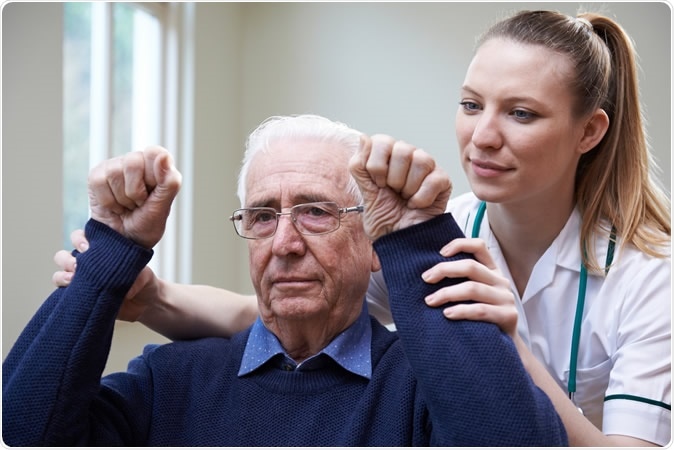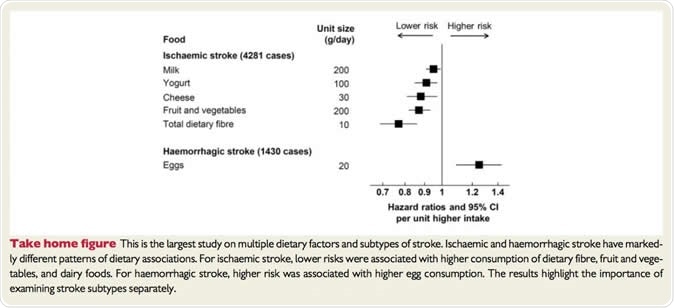In one of the most extensive studies, researchers have found the connection between different types of food and types of stroke risk. The study titled, “The associations of major foods and fiber with risks of ischaemic and hemorrhagic stroke: a prospective study of 418,329 participants in the EPIC cohort across nine European countries,” was published in the latest issue of the journal European Heart Journal today.

Image Credit: SpeedKingz / Shutterstock
The experts explained that ischemic stroke is a stroke when blood clots clog the arteries of the brain, and this stops or impairs the blood supply to different parts of the brain leading to a stroke. Hemorrhagic strokes occur when one or more arteries within the brain rupture leading to internal bleeding within the brain. This collection of blood leads to pressure on vital regions of the brain.
Of all the strokes, 85 percent are ischemic, while 15 percent are hemorrhagic. The team added that in 2013, the second most common cause of death was due to strokes and strokes were the third most prevalent cause of disability across the globe.
A study including over 418,000 people from nine European countries was reported today, and researchers explained that the risk of ischemic stroke was reduced with a higher intake of fruits and vegetables, fiber in diet and dairy products such as milk, cheese, and yogurt. These foods, however, did not lower the risk of getting a hemorrhagic stroke, the team found. With increased consumption of eggs, the risk of hemorrhagic stroke rose, but the risk of ischemic stroke remained unchanged.
According to the first author of the study, Dr. Tammy Tong, a nutritional epidemiologist from the Nuffield Department of Population Health, University of Oxford (UK), “The most important finding is that higher consumption of both dietary fiber and fruit and vegetables was strongly associated with lower risks of ischaemic stroke, which supports current European guidelines.

Figure showing which foods are associated with a low or high risk of ischaemic or hemorrhagic stroke. Image Credit: European Heart Journal
The general public should be recommended to increase their fiber and fruit and vegetable consumption if they are not already meeting these guidelines.” Tong added, “Our study also highlights the importance of examining stroke subtypes separately, as the dietary associations differ for ischaemic and hemorrhagic stroke, and is consistent with other evidence, which shows that other risk factors, such as cholesterol levels or obesity, also influence the two stroke subtypes differently.”
For this study, the team looked at data from 418,329 men and women belonging to Denmark, Germany, Greece, Italy, The Netherlands, Norway, Spain, Sweden, and the United Kingdom. These participants were part of the European Prospective Investigation into Cancer and Nutrition (EPIC) study between 1992 and 2000.
They were all given a questionnaire to answer that looked at their lifestyle, history of other diseases, socioeconomic factors, age, gender, etc. and the individuals were followed up for an average of around 12.7 years. During this time, there were 4281 cases of ischemic strokes and 1430 cases of hemorrhagic stroke.
A detailed record of the dietary habits of the individuals was taken into consideration and analyzed vis a vis risk of strokes. Some of the foods considered included meats (red and poultry, processed), fish (fatty fish and white fish), dairy products (cheese, yogurt, and milk), cereals (cereals and cereal products), fruit and vegetables, eggs, nuts, seeds and legumes, and fiber. Dietary fibers count included total fiber as well as fiber from cereal, fruits, and vegetable fibers.
Results showed the following;
- Fruits and vegetable consumption lowered the risk of ischemic strokes (for 200 g/day higher intake lowered risk by 13 percent)
- Dietary fiber consumption lowered the risk of ischemic strokes (for 10 g/day higher intake the risk was lowered by 23 percent)
- Milk consumption lowered the risk of ischemic strokes (for 200 g/day higher intake)
- Yogurt consumption lowered the risk of ischemic strokes (for 100 g/day higher intake)
- Cheese consumption lowered the risk of ischemic strokes (for 30 g/day higher intake)
- Red meat consumption raised the risk of ischemic strokes (for 50 g/day higher intake)
- Egg consumption raised the risk of hemorrhagic strokes (for 20 g/day higher intake the risk was raised by 25 percent)
The European Society of Cardiology (ESC) and the World Health Organization Regional Office for Europe have also recommended the consumption of at least 400 gm of fruits and vegetables per day and 30 to 45 g of fiber per day. The experts added that the effects of the foods on blood pressure and cholesterol could be the reason behind the raised risk of strokes with these foods. The authors of the study concluded, “Risk of ischaemic stroke was inversely associated with consumption of fruit and vegetables, dietary fiber, and dairy foods, while the risk of hemorrhagic stroke was positively associated with egg consumption.”
Journal reference:
Tammy Y N Tong, Paul N Appleby, Timothy J Key, Christina C Dahm, Kim Overvad, Anja Olsen, Anne Tjønneland, Verena Katzke, Tilman Kühn, Heiner Boeing, Anna Karakatsani, Eleni Peppa, Antonia Trichopoulou, Elisabete Weiderpass, Giovanna Masala, Sara Grioni, Salvatore Panico, Rosario Tumino, Jolanda M A Boer, W M Monique Verschuren, J Ramón Quirós, Antonio Agudo, Miguel Rodríguez-Barranco, Liher Imaz, María-Dolores Chirlaque, Conchi Moreno-Iribas, Gunnar Engström, Emily Sonestedt, Marcus Lind, Julia Otten, Kay-Tee Khaw, Dagfinn Aune, Elio Riboli, Nicholas J Wareham, Fumiaki Imamura, Nita G Forouhi, Emanuele di Angelantonio, Angela M Wood, Adam S Butterworth, Aurora Perez-Cornago, The associations of major foods and fibre with risks of ischaemic and haemorrhagic stroke: a prospective study of 418,329 participants in the EPIC cohort across nine European countries, European Heart Journal, ehaa007, https://doi.org/10.1093/eurheartj/ehaa007